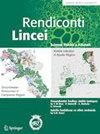大黄素在小鼠化学性肝损伤模型中的保护作用
IF 2.7
4区 综合性期刊
Q2 MULTIDISCIPLINARY SCIENCES
引用次数: 0
摘要
四氯化碳(CCl4)引起的慢性肝损伤可诱发肝纤维化,并可发展为肝硬化和肝细胞癌。本研究探讨了大黄素对ccl4诱导的小鼠肝纤维化和炎症的影响及其潜在机制。虽然先前的研究已经承认CCl4在肝纤维化中的作用,但大黄素的潜在治疗价值仍未得到充分探索。该研究试图通过评估ccl4诱导肝纤维化的形态学变化和分子机制以及研究大黄素的潜在治疗作用来弥合这一差距。30只雄性白化大鼠分为三组(每组10只),接受为期8周的CCl4治疗,最后2周补充大黄素。对肝组织进行形态学、生化和分子分析。苏木精和伊红染色以及酶水平评估显示,CCl4暴露导致肝损伤和肝酶水平升高。相比之下,给药大黄素导致酶水平降低,表明对肝功能有潜在的治疗益处。分子分析显示,CCl4导致SMAD4、α-SMA、TGF、MDA、Nrf2、促炎因子IL-6、TNF-α等标志物mRNA表达增加。然而,大黄素和CCl4联合治疗下调了这些基因,上调了抗炎标志物IL-1β和IL-10,以及肝脏和癌症特异性标志物,如HNF-α、白蛋白、p53和AFP。这些发现提示大黄素可作为减轻ccl4引起的肝损伤和炎症的治疗剂。大黄素调节TGFβ/Smad4通路在减轻CCl4引起的肝纤维化和炎症中起关键作用。因此,这项研究弥合了动物研究和潜在临床应用之间的差距,为未来治疗肝纤维化和炎症的治疗策略提供了重要的见解。本文章由计算机程序翻译,如有差异,请以英文原文为准。

Hepatoprotective role of emodin in chemical-induced liver injury histopathological study in mice model
Chronic liver injury caused by carbon tetrachloride (CCl4) induces liver fibrosis, which can escalate to cirrhosis and hepatocellular carcinoma. This study investigated emodin’s impact on CCl4-induced liver fibrosis and inflammation in mice, along with its underlying mechanisms. While previous studies have acknowledged CCl4's role in liver fibrosis, the potential therapeutic value of emodin remains inadequately explored. The study sought to bridge this gap by assessing morphological changes and molecular mechanisms contributing to CCl4-induced liver fibrosis and investigating emodin's potential therapeutic effects. Thirty male albino rats were split into three groups (n = 10 each), undergoing an 8-week CCl4 regimen, supplemented by emodin during the final 2 weeks. Morphological, biochemical, and molecular analyses were performed on liver tissues. Hematoxylin and eosin staining, as well as enzyme-level assessments, exposed significant liver damage and elevated liver enzyme levels due to CCl4 exposure. In contrast, emodin administration resulted in reduced enzyme levels, indicating potential therapeutic benefits for liver function. Molecular analysis revealed increased mRNA expression of markers like SMAD4, α-SMA, TGF, MDA, Nrf2, and pro-inflammatory factors IL-6 and TNF-α due to CCl4. However, combined emodin and CCl4 treatment downregulated these genes and upregulated anti-inflammatory markers IL-1β and IL-10, alongside hepatic and cancer-specific markers like HNF-α, albumin, p53, and AFP. These findings suggest emodin as a therapeutic agent for mitigating CCl4-induced liver damage and inflammation. Emodin's regulation of the TGFβ/Smad4 pathway plays a pivotal role in attenuating liver fibrosis and inflammation caused by CCl4. Consequently, this study bridges the gap between animal studies and potential clinical applications, providing crucial insights for future therapeutic strategies addressing liver fibrosis and inflammation.
求助全文
通过发布文献求助,成功后即可免费获取论文全文。
去求助
来源期刊

Rendiconti Lincei-Scienze Fisiche E Naturali
MULTIDISCIPLINARY SCIENCES-
CiteScore
4.10
自引率
10.00%
发文量
70
审稿时长
>12 weeks
期刊介绍:
Rendiconti is the interdisciplinary scientific journal of the Accademia dei Lincei, the Italian National Academy, situated in Rome, which publishes original articles in the fi elds of geosciences, envi ronmental sciences, and biological and biomedi cal sciences. Particular interest is accorded to papers dealing with modern trends in the natural sciences, with interdisciplinary relationships and with the roots and historical development of these disciplines.
 求助内容:
求助内容: 应助结果提醒方式:
应助结果提醒方式:


